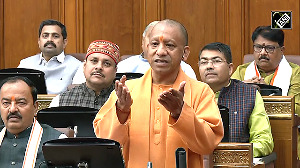India stands 40th in 'network readiness' in the world, having slipped from the 39th spot it held last year. However, it is above China (50th) and Pakistan (67th) and Sri Lanka (83rd). (See entire table below)
The United States tops the rankings in The Global Information Technology Report 2005-2006's 'Networked Readiness Index,' for the third time in five years, maintaining its eminent position as a leader in the area of innovation and confirming its position as an information and communication technology powerhouse.
With record coverage of 115 economies worldwide and published for the fifth consecutive year, The Global Information Technology Report (GITR) has grown into the world's most respected assessment of the impact of information and communication technology (ICT) on the development process and the competitiveness of nations.
The Networked Readiness Index (NRI) measures the propensity for countries to leverage the opportunities offered by ICT for development and increased competitiveness. It also establishes a broad international framework mapping out the enabling factors of such capacity.
The report is produced by the World Economic Forum in cooperation with INSEAD and is sponsored this year by Cisco Systems.
"Information and communication technologies presently represent one of the most important drivers in boosting efficiency and productivity in today's fast changing global economy. The United States has been for many years an ICT powerhouse, and its sustained ability to harness these technologies so effectively for boosting the efficiency of its economy and its many markets provides a standard of measurement for other countries wishing to rapidly improve the living standards of their citizens," said Augusto Lopez-Claros, director of the Global Competitiveness Network at the World Economic Forum and co-editor of the report, in a media statement.
"The long pipeline of scientific and technological innovation is a remarkable source of strength for the US economy which, large macroeconomic imbalances notwithstanding, remains a choice destination for foreign capital," he added.
Klaus Schwab, founder and executive chairman of the World Economic Forum, meanwhile said: "The Global Information Technology Report series represents the result of a collaborative research effort, and over the years has become a powerful tool for governments, businesses and civil societies to assess the extent to which information and communication technologies are being used by economies to better leverage the development process."
"It also permits us to benchmark the performance of each economy against more than 100 other nations, and highlight best practices and policies," Schwab added.
Under the theme 'Leveraging ICT for development,' The Global Information Technology Report appears at a critical time for the global economy: a mood of cautious optimism about the short-term outlook is tempered by growing concern about other less auspicious trends, from the possible repercussions of global macroeconomic imbalances to the impact of rising income disparities.
However, ICT is clearly emerging as one of the key drivers of economic growth and competitiveness. In line with the World Economic Forum's sustained efforts to expand the geographical coverage of the Report, this year 11 new countries from diverse regions of the world (mainly Eurasia, Asia and Africa) have been included in the sample.
"Networking and communication technologies are enhancing the way people communicate and exchange ideas, opening the next horizon for creativity, innovation, growth and competitive advantage. The strong link between the Networked Readiness Index and global competitiveness has increased and is evidence of the critical role that these technologies play in any economy or company's strategic plans. The GITR will provide all of us with greater insight and help to guide our future decisions," said John Chambers, President and CEO of Cisco Systems.
The Networked Readiness Index examines an economy's ICT condition on three dimensions: the general macroeconomic, regulatory and infrastructure environment for ICT; the readiness of the three key stakeholders -- individuals, businesses and governments þu to use and benefit from ICT; and their actual usage of the latest information and communication technologies.
Soumitra Dutta, Professor of Business and Technology and Dean of Executive Education at INSEAD, explained: "The Networked Readiness Index has become a globally accepted benchmark of an economy's participation in the networked economy. The Networked Readiness Index provides a useful indicator to decision leaders from the private and public sectors about the role of technology in driving the competitiveness and productivity of nations."
Highlights
The United States regains the top position in the rankings, reflecting an impressive performance in the areas of ICT physical infrastructure, a broadly supportive market environment and high levels of business and government usage of the latest technologies. The United States continues to lead the world in technological innovation, helped by the excellent quality of its higher education institutions and extensive levels of cooperation between its research bodies and the business community.
The United States also stands out for the ready availability of venture capital -- key for start-ups to develop and prosper in what can be a risky sector. Also noteworthy is the prominent role assumed by the private sector in research and development as well as cooperation with the public sector in innovation and ICT penetration. Indeed, 17 of the 36 World Economic Forum Technology Pioneers 2006 (www.weforum.org/techpioneers) come from the United States.
Singapore, in second place overall, maintains its commanding position having achieved a top-three ranking for the fourth consecutive year. Singapore has an excellent regulatory environment, world-class levels of education and training, and a government that is committed to enhancing the use of the latest technologies across all sectors of the economy -- all in a context of excellent macroeconomic management and persistent efforts to improve the institutional environment for economic activity.
Nordic countries maintain their positions at the top of the rankings, with Denmark, Iceland, Finland and Sweden in third, fourth, fifth and eighth places, respectively. Nordic countries have registered consistently high ICT penetration rates and have occupied places in the top ten positions over the last five years.
Their high rankings reflect the same set of factors that have propelled these economies to the top of the world competitiveness league. These factors include highly developed educational institutions which have fostered a strong culture of innovation; transparency in government which has contributed to the emergence of a friendly climate for new business ventures; and a strong predisposition to adopt the latest technologies, in government, the business community and civil society.
Asia and the Pacific also do extremely well this year with Taiwan, Hong Kong, Korea, Australia and Japan occupying ranks 7, 11, 14, 15 and 16, respectively.
India broadly maintains its position with respect to last year (at 40th place), while China drops 9 positions to 50th place, widening the performance gap with respect to India.
Especially noteworthy is the showing of Taiwan, gaining 8 positions from last year and entering in the top ten for the first time. The rise of Taiwan as an ICT powerhouse in the last three decades, as a result of intelligent public policies and public-private synergies in the ICT sector, is indeed exceptional and is the object of a specific case study included in the Report this year.
Estonia leads the eastern European countries with a rank of 23 out of 115 (gaining two positions from last year), thanks to its excellent political and regulatory framework for ICT.
The highest ranking Latin American countries are Chile (29), Brazil (52) and Mexico (55). Compared with last year's generalized decreasing trend, the region displays a more varied performance this year, with several countries markedly improving their positions, notably Chile (up 6), Mexico (up 5), El Salvador (up 11), Colombia (up 4) and Argentina (up 5).
This encouraging development is unfortunately accompanied by a further slide of countries such as Brazil (down 6), Costa Rica (down 8) and Guatemala (down 10).
Although South Africa drops three positions from 34 last year to 37 this year, the country leads sub-Saharan Africa in terms of networked readiness. Mauritius (ranked 45) and Botswana (ranked 56) follow South Africa. While Mauritius has improved its performance by two positions, Botswana has dropped six positions from last year.
In other markets, Israel remains the top performer in the Middle East. Posting a rank of 19 overall, Israel shows excellent scores in areas such as technological sophistication, the quality of scientific research institutions, the availability of venture capital, cellular telephones and the latest technologies.
Given Israel's excellent ICT performance, this year's report includes a case study exploring the role government policies had in the development of a first-class ICT industry in the country. The United Arab Emirates (UAE) is the top performer in the Gulf region, with a rank of 28. Tunisia, in position 36, has the highest ranking in North Africa.
The editors of the report are Soumitra Dutta of INSEAD and Augusto Lopez-Claros and Irene Mia of the World Economic Forum.
|
Networked Readiness Index 2005 |
| ||||
|
Countries |
Score 2005 |
Rank 2005 |
Rank 2004 |
Evolution |
|
|
United States |
2.02 |
1 |
5 |
Up |
4 |
|
Singapore |
1.89 |
2 |
1 |
Down |
-1 |
|
Denmark |
1.80 |
3 |
4 |
Up |
1 |
|
Iceland |
1.78 |
4 |
2 |
Down |
-2 |
|
Finland |
1.72 |
5 |
3 |
Down |
-2 |
|
Canada |
1.54 |
6 |
10 |
Up |
4 |
|
Taiwan |
1.51 |
7 |
15 |
Up |
8 |
|
Sweden |
1.49 |
8 |
6 |
Down |
-2 |
|
Switzerland |
1.48 |
9 |
9 |
Steady |
0 |
|
United Kingdom |
1.44 |
10 |
12 |
Up |
2 |
|
Hong Kong SAR |
1.44 |
11 |
7 |
Down |
-4 |
|
Netherlands |
1.39 |
12 |
16 |
Up |
4 |
|
Norway |
1.33 |
13 |
13 |
Steady |
0 |
|
Korea, Rep. |
1.31 |
14 |
24 |
Up |
10 |
|
Australia |
1.28 |
15 |
11 |
Down |
-4 |
|
Japan |
1.24 |
16 |
8 |
Down |
-8 |
|
Germany |
1.18 |
17 |
14 |
Down |
-3 |
|
Austria |
1.18 |
18 |
19 |
Up |
1 |
|
Israel |
1.16 |
19 |
18 |
Down |
-1 |
|
Ireland |
1.15 |
20 |
22 |
Up |
2 |
|
New Zealand |
1.14 |
21 |
21 |
Steady |
0 |
|
France |
1.11 |
22 |
20 |
Down |
-2 |
|
Estonia |
0.96 |
23 |
25 |
Up |
2 |
|
Malaysia |
0.93 |
24 |
27 |
Up |
3 |
|
Belgium |
0.87 |
25 |
26 |
Up |
1 |
|
Luxembourg |
0.80 |
26 |
17 |
Down |
-9 |
|
Portugal |
0.56 |
27 |
30 |
Up |
3 |
|
United Arab Emirates |
0.54 |
28 |
23 |
Down |
-5 |
|
Chile |
0.52 |
29 |
35 |
Up |
6 |
|
Malta |
0.51 |
30 |
28 |
Down |
-2 |
|
Spain |
0.47 |
31 |
29 |
Down |
-2 |
|
Czech Republic |
0.36 |
32 |
40 |
Up |
8 |
|
Cyprus |
0.36 |
33 |
37 |
Up |
4 |
|
Thailand |
0.35 |
34 |
36 |
Up |
2 |
|
Slovenia |
0.34 |
35 |
32 |
Down |
-3 |
|
Tunisia |
0.33 |
36 |
31 |
Down |
-5 |
|
South Africa |
0.30 |
37 |
34 |
Down |
-3 |
|
Hungary |
0.27 |
38 |
38 |
Steady |
0 |
|
Qatar |
0.25 |
39 |
n/a |
New |
|
|
INDIA |
0.23 |
40 |
39 |
Down |
-1 |
|
Slovak Republic |
0.19 |
41 |
48 |
Up |
7 |
|
Italy |
0.16 |
42 |
45 |
Up |
3 |
|
Greece |
0.08 |
43 |
42 |
Down |
-1 |
|
Lithuania |
0.08 |
44 |
43 |
Down |
-1 |
|
Mauritius |
0.07 |
45 |
47 |
Up |
2 |
|
Kuwait |
0.06 |
46 |
n/a |
New |
|
|
Jordan |
0.03 |
47 |
44 |
Down |
-3 |
|
Turkey |
0.00 |
48 |
52 |
Up |
4 |
|
Bahrain |
0.00 |
49 |
33 |
Down |
-16 |
|
China |
-0.01 |
50 |
41 |
Down |
-9 |
|
Latvia |
-0.03 |
51 |
56 |
Up |
5 |
|
Brazil |
-0.04 |
52 |
46 |
Down |
-6 |
|
Poland |
-0.09 |
53 |
72 |
Up |
19 |
|
Jamaica |
-0.11 |
54 |
49 |
Down |
-5 |
|
Mexico |
-0.14 |
55 |
60 |
Up |
5 |
|
Botswana |
-0.16 |
56 |
50 |
Down |
-6 |
|
Croatia |
-0.23 |
57 |
58 |
Up |
1 |
|
Romania |
-0.23 |
58 |
53 |
Down |
-5 |
|
El Salvador |
-0.24 |
59 |
70 |
Up |
11 |
|
Kazakhstan |
-0.24 |
60 |
n/a |
New |
|
|
Ghana |
-0.25 |
61 |
65 |
Up |
4 |
|
Colombia |
-0.27 |
62 |
66 |
Up |
4 |
|
Egypt |
-0.29 |
63 |
57 |
Down |
-6 |
|
Bulgaria |
-0.31 |
64 |
73 |
Up |
9 |
|
Uruguay |
-0.31 |
65 |
64 |
Down |
-1 |
|
Panama |
-0.33 |
66 |
69 |
Up |
3 |
|
Pakistan |
-0.34 |
67 |
63 |
Down |
-4 |
|
Indonesia |
-0.36 |
68 |
51 |
Down |
-17 |
|
Costa Rica |
-0.37 |
69 |
61 |
Down |
-8 |
|
Philippines |
-0.37 |
70 |
67 |
Down |
-3 |
|
Argentina |
-0.38 |
71 |
76 |
Up |
5 |
|
Russian Federation |
-0.39 |
72 |
62 |
Down |
-10 |
|
Azerbaijan |
-0.40 |
73 |
n/a |
New |
|
|
Trinidad and Tobago |
-0.42 |
74 |
59 |
Down |
-15 |
|
Vietnam |
-0.47 |
75 |
68 |
Down |
-7 |
|
Ukraine |
-0.49 |
76 |
82 |
Up |
6 |
|
Morocco |
-0.51 |
77 |
54 |
Down |
-23 |
|
Namibia |
-0.53 |
78 |
55 |
Down |
-23 |
|
Uganda |
-0.60 |
79 |
77 |
Down |
-2 |
|
Serbia and Montenegro |
-0.63 |
80 |
79 |
Down |
-1 |
|
Venezuela |
-0.65 |
81 |
84 |
Up |
3 |
|
Macedonia, FYR |
-0.67 |
82 |
85 |
Up |
3 |
|
Sri Lanka |
-0.68 |
83 |
71 |
Down |
-12 |
|
Tanzania |
-0.69 |
84 |
83 |
Down |
-1 |
|
Peru |
-0.70 |
85 |
90 |
Up |
5 |
|
Armenia |
-0.72 |
86 |
n/a |
New |
|
|
Algeria |
-0.72 |
87 |
80 |
Down |
-7 |
|
Gambia, The |
-0.72 |
88 |
74 |
Down |
-14 |
|
Dominican Republic |
-0.73 |
89 |
78 |
Down |
-11 |
|
Nigeria |
-0.74 |
90 |
86 |
Down |
-4 |
|
Kenya |
-0.75 |
91 |
75 |
Down |
-16 |
|
Mongolia |
-0.76 |
92 |
n/a |
New |
|
|
Tajikistan |
-0.77 |
93 |
n/a |
New |
|
|
Moldova |
-0.78 |
94 |
n/a |
New |
|
|
Mali |
-0.78 |
95 |
92 |
Down |
-3 |
|
Georgia |
-0.82 |
96 |
91 |
Down |
-5 |
|
Bosnia and Herzegovina |
-0.87 |
97 |
89 |
Down |
-8 |
|
Guatemala |
-0.88 |
98 |
88 |
Down |
-10 |
|
Cameroon |
-0.88 |
99 |
n/a |
New |
|
|
Honduras |
-0.89 |
100 |
97 |
Down |
-3 |
|
Mozambique |
-0.94 |
101 |
96 |
Down |
-5 |
|
Madagascar |
-0.99 |
102 |
87 |
Down |
-15 |
|
Kyrgyz Republic |
-1.01 |
103 |
n/a |
New |
|
|
Cambodia |
-1.03 |
104 |
n/a |
New |
|
|
Zimbabwe |
-1.04 |
105 |
94 |
Down |
-11 |
|
Albania |
-1.04 |
106 |
n/a |
New |
|
|
Ecuador |
-1.07 |
107 |
95 |
Down |
-12 |
|
Benin |
-1.07 |
108 |
n/a |
New |
|
|
Bolivia |
-1.10 |
109 |
99 |
Down |
-10 |
|
Bangladesh |
-1.11 |
110 |
100 |
Down |
-10 |
|
Guyana |
-1.11 |
111 |
n/a |
New |
|
|
Nicaragua |
-1.14 |
112 |
103 |
Down |
-9 |
|
Paraguay |
-1.23 |
113 |
98 |
Down |
-15 |
|
Chad |
-1.36 |
114 |
104 |
Down |
-10 |
|
Ethiopia |
-1.39 |
115 |
102 |
Down |
-13 |
Source: World Economic Forum






 © 2025
© 2025